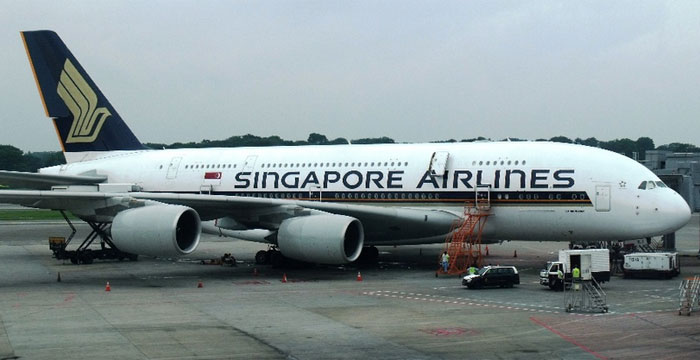Touch your heart and ask yourself this: As a Singaporean, can you even name Singapore Airlines' Chief Executive Officer?
You know who Richard Branson is. You obviously have heard of Steve Jobs. And you'd have even heard of Sim Wong Hoo. Or Olivia Lum.
But the CEO of Singapore Airlines, one of the most raved about airlines in the world?
If you're clueless, it's really not your fault.
And not knowing the CEO's name is also probably the least of SIA's worries.
Everything that is wrong with SIA now -- from how locals cannot afford to buy its tickets, to its dwindling service standards, to Singaporeans' inability to embrace it even though it is a national asset -- is helpfully explained and dissected in this insightful and highly-critical article.
It is written by Emmanuel Daniel, a highly-regarded Singapore-based entrepreneur, belletrist and speaker on the international circuit on topics relating to the financial services industry.
So, here are the eight factors that led to the current situation at SIA:
1. Singapore's way of running a business is to make it appear as if decision-makers were faceless.
"The Singapore government is at fault because the idea that many things about Singapore was built by faceless committees has a nice touch to it. But Singapore itself is an example that nothing worth building was ever built by a committee. It was built by a few men who had a sense of ownership over what they built with that rare combination of guts, vision and execution skills."
2. It is the board of SIA who chose a colourless personality as CEO.
"In the same way, we have to ask, why did the board of Singapore Airlines choose such a colourless personality to lead what is in effect the pride of a country’s asset – it’s national airline? Someone whose first media interview as CEO involved his press manager sitting next to him and virtually coaxing the replies out of him, when a core skill of any leader was to tell the story. Any number of worldly wise executives could have handled the press naturally as part of his job as chief executive. A crew member on board a flight on his own airline could not describe the CEO beyond saying that he “walked from his seat to the toilet and back” the entire flight. "
3. Scholars are not the answers to running corporate Singapore well.
"Not identifying the fact that this airline was born out of one man’s genius [J.Y. Pillay] was a big mistake. Because it gave subsequent generations of pen-pushing senior managers armed with first class degrees that have no bearing on the job the right to brag about their indispensability. Until Ryan Air and Air Asia came about to show that executives without university qualifications can do just as good a job and fill their planes to the brim every single day, we were all fooled to think that corporate Singapore could only be run by scholars."
The current CEO has three degrees and holds a Master of Science degree, all from the Massachusetts Institute of Technology.
J.Y.Pillay was the Chairman of Singapore Airlines (1972 - 1996). He is currently the Chairman of the Council of Presidential Advisers. He is the Acting President when President Tony Tan is away.
4. The core SIA business has been diluted profoundly.
"The people at Temasek, the state-owned asset management company that controls Singapore Airlines, like to constantly say how they don’t control Singapore Airlines."
"But the fact that the management team at Singapore Airlines today has to contend managing four different assets: Singapore Airlines, SilkAir, Tiger Airways and now Scoot, is an interference in a more profound way."
5. The SIA board is more accountable and responsible than the CEO.
"So it is, that the reason Singapore Airlines has such a weak and uninspiring chief executive is not because he is a good worker, or that he has great integrity, all of which I am sure he has in abundance. But because that it is all he will be required to be. The board has taken on itself all the leadership roles of making the strategic decisions for the company."
6. Obscurity provides a shield of protection.
"But the fact that not a single Singapore Airlines management staff, least of all the chief executive, can explain convincingly to any investor or even a customer as to why they need to manage four different assets, is an indication of just how dangerous it is. It is an even more dangerous experiment because if it fails, it will be nobody’s fault."
7. It is the media's fault for not putting the spotlight on the CEO.
"The fact that both Chew and Cheong were able to sail through their years shamelessly without scrutiny is also directly the result of the lack of rigorous scrutiny of the media. The cosy relationship that corporate Singapore enjoys with its local media. Very senior industry editors do nothing more than behave like rookie reporters."
Chew and Cheong refers to Chew Choong Seng and Cheong Choong Kong, ex-CEOs of SIA.
8. Where the customer is not king
"The guys who price tickets are going nuts treating premium ticket passengers like budget airline bums – shorter validity, high penalty fees and so on. This is the only airline that is capable of making a full fare paying first class passenger cry because she had to pay a US$300 penalty for missing her flight at the gate, with boarding pass in hand. On top of that, it chided the ground handling company for trying to restore some dignity to the situation."
Answer: The SIA CEO's name is Goh Choon Phong.
Come on, hand over $20.
Related article:
AirAsia is sponsoring Football Association of Singapore? Why not?
Top photo from here
If you like what you read, follow us on Facebook, Instagram, Twitter and Telegram to get the latest updates.

